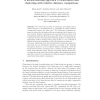Free Online Productivity Tools
i2Speak
i2Symbol
i2OCR
iTex2Img
iWeb2Print
iWeb2Shot
i2Type
iPdf2Split
iPdf2Merge
i2Bopomofo
i2Arabic
i2Style
i2Image
i2PDF
iLatex2Rtf
Sci2ools
PKDD
2015
Springer
2015
Springer
A Kernel-Learning Approach to Semi-supervised Clustering with Relative Distance Comparisons
We consider the problem of clustering a given dataset into k clusters subject to an additional set of constraints on relative distance comparisons between the data items. The additional constraints are meant to reflect side-information that is not expressed in the feature vectors, directly. Relative comparisons can express structures at finer level of detail than must-link (ML) and cannot-link (CL) constraints that are commonly used for semi-supervised clustering. Relative comparisons are particularly useful in settings where giving an ML or a CL constraint is difficult because the granularity of the true clustering is unknown. Our main contribution is an efficient algorithm for learning a kernel matrix using the log determinant divergence (a variant of the Bregman divergence) subject to a set of relative distance constraints. Given the learned kernel matrix, a clustering can be obtained by any suitable algorithm, such as kernel k-means. We show empirically that kernels found by our ...
Data Mining | PKDD 2015 |
Related Content
| Added | 16 Apr 2016 |
| Updated | 16 Apr 2016 |
| Type | Journal |
| Year | 2015 |
| Where | PKDD |
| Authors | Ehsan Amid, Aristides Gionis, Antti Ukkonen |
Comments (0)

